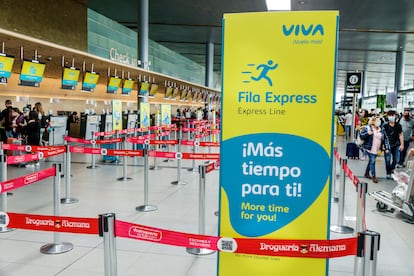Viva Air cancels all its flights and unleashes chaos in Colombia
The country’s aviation authority continues to study Avianca’s merger request with the low-cost carrier and urges the company to respect passenger rights

Viva Air, the low-cost airline from Colombia, announced on Tuesday that it is ceasing all operations after 11 years of activity. It is a prolonged “see you later,” brought on by the company’s fragile financial situation as well as the delay by Colombian authorities in approving the airline’s requested merger with Avianca, Colombia’s main carrier. However, the regulator pointed out that the review of the merger is moving forward according to the stipulated times, and that the agency will not take into account Viva Air’s untimely decision, which left hundreds of passengers stranded at airports, some of whom had international connections.
The aviation authority’s announcement is a statement of intent: it affirmed that it is fulfilling its task and rejected the pressure imposed by Viva Air, which was founded in 2009 in Medellín. In its statement, the regulator emphasized that it will watch closely whether the carrier respects the “rights of the affected” passengers. According to the government agency, “thousands” of passengers will not make their flights after Viva Air’s decision.
Viva Air responded by noting that 5,000 employees who “directly and indirectly” depend on the company could lose their jobs after waiting for “more than seven months” for the agency to finish its review of the merger. Viva Air, which once had 43 domestic and 13 international routes, has been a victim of the blows dealt to the airline business by the pandemic. While the company took advantage of a law aimed at rescuing businesses from any debt accrued because of the pandemic, it appears that it did not help the carrier get back on its feet.
A series of events last week foreshadowed the carrier’s move to cease its operations: the company’s president Félix Antelo resigned, and Viva Air grounded 13 planes. According to former superintendent of Industry and Commerce, Emilio José Archila, the company’s decision is detrimental to consumer rights: “It is incredible that they have stopped the planes and sacrificed passengers” after refusing to acknowledge offers from other competitors who were interested in buying out the company.
He was referring to the Chilean carrier Latam, the largest in the region, and JetSmart, also a low-cost airline, which have recently expressed their interest in taking over the Colombian airline and pulling it out of the abyss. But any transaction must still be approved by the country’s Superintendence of Industry and Commerce, which since December has been conducting an investigation to clarify whether the merger between Viva Air and Avianca is a fait accompli since April of last year. If it is, that would mean that the companies merged without getting the approval of the control agencies.
Jorge Enrique Sanchez, also a former superintendent of Industry and Commerce, has opposed from the start the merger between Viva and Avianca because, in his opinion, it creates a clear monopoly. He called Viva Air’s Tuesday decision “the equivalent of a kidnapping: the exchange currency is the passengers.” The Superintendence of Transportation has been more moderate, while calling on passengers to remain calm and avoid “aggression towards Viva officials.”
Additionally, the Minister of Transportation Guillermo Reyes told Caracol Radio that a meeting is scheduled to analyze a solution to the crisis. Likewise, in order to provide alternatives to the affected passengers, Reyes said that agreements are being sought with other companies to cover the affected routes. The Superintendence of Transportation, he concluded, will have to study whether it is necessary to open a disciplinary process against Viva Air for having continued with the sale of tickets and baggage registration without informing users about the suspension of its operations.
Colombia’s aviation authority authorized using Latam, Avianca and the state-owned Satena as alternatives to mobilize those affected by the closure of Viva Air’s operations. Likewise, it announced that the Airport Intermediation Group, a support body of the agency, will accompany passengers throughout the process.
Sign up for our weekly newsletter to get more English-language news coverage from EL PAÍS USA Edition
Tu suscripción se está usando en otro dispositivo
¿Quieres añadir otro usuario a tu suscripción?
Si continúas leyendo en este dispositivo, no se podrá leer en el otro.
FlechaTu suscripción se está usando en otro dispositivo y solo puedes acceder a EL PAÍS desde un dispositivo a la vez.
Si quieres compartir tu cuenta, cambia tu suscripción a la modalidad Premium, así podrás añadir otro usuario. Cada uno accederá con su propia cuenta de email, lo que os permitirá personalizar vuestra experiencia en EL PAÍS.
¿Tienes una suscripción de empresa? Accede aquí para contratar más cuentas.
En el caso de no saber quién está usando tu cuenta, te recomendamos cambiar tu contraseña aquí.
Si decides continuar compartiendo tu cuenta, este mensaje se mostrará en tu dispositivo y en el de la otra persona que está usando tu cuenta de forma indefinida, afectando a tu experiencia de lectura. Puedes consultar aquí los términos y condiciones de la suscripción digital.









































